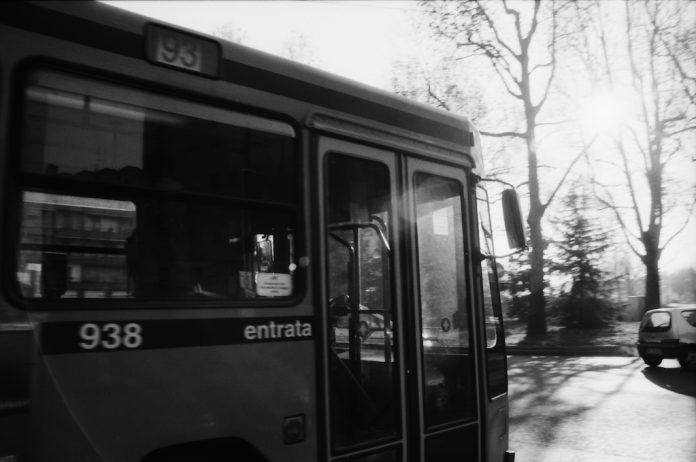“So how’s that 554?” I asked.
Buses are microcosms of the neighborhoods they serve, and the 554 was what this young man was headed toward. That cushy suburban express route with its soft seats and open highways… it seemed a far cry from where we were now, trundling up the bowels of the inner city on a nighttime 7.
“How d’you mean?”
“Well, do you ride it a lot?”
“No, I’m totally new to all of this, actually,” he said. “My first time using buses here in Seattle.” A younger mixed-race man like myself, with a working-class smile and unassuming clothes, the uncomplicated Seattle wardrobe of blue, black and tan.
“Oh, cool!” I replied. “I love that you’re using both the 7 and the 554.”
“Yeah I could already tell, they’re so different!”
“How?” I love hearing stuff like this. I have my own answer, but I was intrigued at what he might have already noticed, with such little exposure.
“Well, as far as I could tell, the 554 drivers… it just seems quieter and more strict. This feels looser and nicer.”
“Yeah I like this one,” I replied. “You get more of everything, the bad and the good. But it all adds up to good, you know?”
I was phrasing it poorly, but hoped he perhaps already shared a bit of my philosophy, such that he’d understand what I meant–that the tumultuous mixture of positive and negative life experience seems to add up, when considered afterwards and from afar, as something best defined overall as positive, worthwhile, good.
“Yeah yeah!” he said, equally inarticulately, but leaning into a similar view. “I like to think, if it doesn’t have something goin’ wrong, then it’s not fun. Like it’s not…”
He trailed off, perhaps caught in the place I’d been–stuck for words, dancing around an idea while unable to touch it, but facing a listener who knows your melody.
“Like that makes it real, the challenge?” I said.
“Yeah!”
“Yeah, I think I know what you mean. It’s those challenges that make us real people.”
“Yeah… But I could already tell there’s not a lot of drivers that do what you do.”
“Ha! Yeah, I feel like it’s important to make it personable, you know?”
“Yeah,”
“Make it feel equal and human. Like some of those strict drivers on the 554 and stuff, I feel like sometimes they’re trying to fight the world, and if you try to fight the world, you’re always going to lose!”
“Dude.Totally! Better to just stay open and learn something.”
“It just feels better. Easier.”
“I couldn’t agree more,” said an older man who felt compelled to join in. He was dressed to match the surroundings, muted colors faded with time and a sailor’s scruffy beard, the kind you know held a thousand stories. I couldn’t tell if the peeling discolorations on his face were bruises, a skin condition of sorts, or a trick of the light. Suffice it to say he didn’t get off at the 554 transfer point.
“To everything you guys just said, your life philosophy,” he continued. “I been listening to what you were saying, and I completely agree. If people would just be compassionate towards each other and recognize each other as humans–“
“Yeah, flowing with instead of against.”
“You just feel a lot less lonely.”
“Ooh, totally. Well said.”
Talking is what kids do, Charles Schulz once wrote, but a conversation… a conversation is when two adults come together and build a third thing, such that when they part they’re slightly different than they were before. That’s what we were doing, the three of us. We continued building, recognizing that blanket judgments of drivers or riders or routes were apt to be flawed, that being kind carries dividends as much for oneself as for others, and that, as the Dalai Lama said, choosing optimism just plain feels better.
I was reminded of the visual image of red-tailed hawks soaring on those invisible cylindrical thermals of air, together following unseen but palpable currents, paths which to them make so much sense. I felt the exhilaration of simple truths, and the comfort of a worldview that takes life’s challenges in stride.
It’s okay to be unhappy as a bus driver. It’s okay to be unhappy walking down the street. I get it. I just try for the opposite. For a moment there, the world made sense to us. We basked in the energizing glow of goodness, at peace with the mysteries of life.
I hoped for each of our sakes that our worldviews would hold up when the going next got tough. It’s easy to be good when things go your way. But: optimism, my parents told me. Optimism means being comfortable looking at truth even when it’s negative.
Because that means your life philosophy can handle it.
Nathan Vass is an artist, filmmaker, photographer, and author by day, and a Metro bus driver by night, where his community-building work has been showcased on TED, NPR, The Seattle Times, KING 5 and landed him a spot on Seattle Magazine’s 2018 list of the 35 Most Influential People in Seattle. He has shown in over forty photography shows is also the director of nine films, six of which have shown at festivals, and one of which premiered at Henry Art Gallery. His book, The Lines That Make Us, is a Seattle bestseller and 2019 WA State Book Awards finalist.



